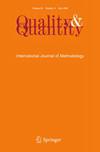贿选在社会上是可取的吗?“失败”列表实验的探索性分析
Q1 Mathematics
引用次数: 0
摘要
摘要列表实验鼓励调查对象报告他们可能不愿意透露的敏感意见。但是,研究有时发现,当被直接问及敏感观点时,受访者更容易承认。通常,这种过度报告被视为设计失败,可归因于注意力不集中或其他非战略性错误。本文对2019年尼日利亚总统选举中衡量贿选行为的“失败”清单实验进行了探索性分析。我们借此机会探讨一下我们对贿选的假设。尽管贿选在许多国家是非法的,而且受到侮辱,但大量文献将这种交易与充满信任、互惠和长期利益的赞助人-客户网络联系起来,这可能会激励个人声称自己被邀请参与贿选。将我们的数据提交给一系列的设计测试,我们发现过度报告是有策略的:受访者故意透露购买选票,而那些透露购买选票的人实际上很可能被邀请参与购买选票。考虑到过度报告的原因,如社会可取性和网络利益,以及过度报告的战略性质,我们认为“设计失败”并不是意外列表实验结果中唯一可能的结论。通过本文,我们证明了我们关于敏感性偏差的理论假设会影响我们从列表实验中得出的结论。本文章由计算机程序翻译,如有差异,请以英文原文为准。
Could vote buying be socially desirable? Exploratory analyses of a ‘failed’ list experiment
Abstract List experiments encourage survey respondents to report sensitive opinions they may prefer not to reveal. But, studies sometimes find that respondents admit more readily to sensitive opinions when asked directly. Often this over-reporting is viewed as a design failure, attributable to inattentiveness or other nonstrategic error. This paper conducts an exploratory analysis of such a ‘failed’ list experiment measuring vote buying in the 2019 Nigerian presidential election. We take this opportunity to explore our assumptions about vote buying. Although vote buying is illegal and stigmatized in many countries, a significant literature links such exchanges to patron-client networks that are imbued with trust, reciprocity and long-standing benefits, which might create incentives for individuals to claim having been offered to participate in vote buying. Submitting our data to a series of tests of design, we find that over-reporting is strategic: respondents intentionally reveal vote buying and it’s likely that those who reveal vote buying have in fact being offered to participate in vote buying. Considering reasons for over-reporting such as social desirability and network benefits, and the strategic nature of over-reporting, we suggest that “design failure" is not the only possible conclusion from unexpected list experiment results. With this paper we show that our theoretical assumptions about sensitivity bias affect the conclusions we can draw from a list experiment.
求助全文
通过发布文献求助,成功后即可免费获取论文全文。
去求助
来源期刊

Quality & Quantity
管理科学-统计学与概率论
CiteScore
4.60
自引率
0.00%
发文量
276
审稿时长
4-8 weeks
期刊介绍:
Quality and Quantity constitutes a point of reference for European and non-European scholars to discuss instruments of methodology for more rigorous scientific results in the social sciences. In the era of biggish data, the journal also provides a publication venue for data scientists who are interested in proposing a new indicator to measure the latent aspects of social, cultural, and political events. Rather than leaning towards one specific methodological school, the journal publishes papers on a mixed method of quantitative and qualitative data. Furthermore, the journal’s key aim is to tackle some methodological pluralism across research cultures. In this context, the journal is open to papers addressing some general logic of empirical research and analysis of the validity and verification of social laws. Thus The journal accepts papers on science metrics and publication ethics and, their related issues affecting methodological practices among researchers.
Quality and Quantity is an interdisciplinary journal which systematically correlates disciplines such as data and information sciences with the other humanities and social sciences. The journal extends discussion of interesting contributions in methodology to scholars worldwide, to promote the scientific development of social research.
 求助内容:
求助内容: 应助结果提醒方式:
应助结果提醒方式:


